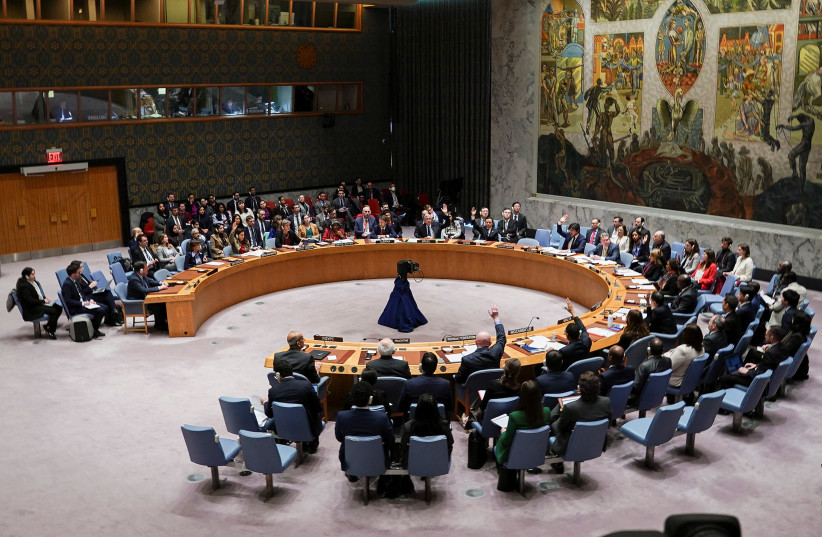UN Security Council acts to boost aid to Gaza after US abstains
The United Nations Security Council on Friday approved a toned-down bid to boost humanitarian aid to the Gaza Strip and called for urgent steps “to create the conditions for a sustainable cessation of hostilities” after a week of vote delays and intense negotiations to avoid a veto by the United States.
Amid global outrage over a rising Gaza death toll in 11 weeks of war between Israel and Hamas and a worsening humanitarian crisis in the Palestinian enclave, the US abstained to allow the 15-member council to adopt a resolution drafted by the United Arab Emirates.
The remaining council members voted for the resolution except for Russia which also abstained.
Following high-level negotiations to win over Washington, the resolution no longer dilutes Israel’s control over all aid deliveries to 2.3 million people in Gaza. Israel monitors the limited aid deliveries to Gaza via the Rafah crossing from Egypt and the Israeli-controlled Kerem Shalom crossing.
But a weakening of language on a cessation of hostilities frustrated several council members – including veto power Russia – and Arab and Organisation of Islamic Cooperation states, some of which, diplomats said, view it as approval for Israel to further act against Hamas for a deadly Oct. 7 attack.

The adopted resolution “calls for urgent steps to immediately allow safe, unhindered, and expanded humanitarian access and to create the conditions for a sustainable cessation of hostilities.” The initial draft had called for “an urgent and sustainable cessation of hostilities” to allow aid access.
Earlier this month the 193-member UN General Assembly demanded a humanitarian ceasefire, with 153 states voting in favor of the move that had been vetoed by the United States in the Security Council days earlier.
The US and Israel oppose a ceasefire, believing it would only benefit Hamas. Washington instead supports pauses in fighting to protect civilians and free hostages taken by Hamas.
Aid monitoring
Last month the United States abstained to allow the Security Council to call for urgent and extended humanitarian pauses in fighting for a “sufficient number of days” to allow aid access. The move came after four unsuccessful attempts to take action.
Washington traditionally shields its ally Israel from UN action and has already twice vetoed Security Council action since an Oct. 7 attack by Hamas terrorists in which Israel says 1,200 people were killed and 240 people taken hostage.
Israel has retaliated against Hamas by bombarding Gaza from the air, imposing a siege and launching a ground offensive. Some 20,000 Palestinians have been killed, according to health officials in Hamas-ruled Gaza.
Most people in Gaza have been driven from their homes and UN officials have warned of a humanitarian catastrophe. The World Food Programme says half of Gaza’s population is starving and only 10% of the food required has entered Gaza since Oct. 7.
A key sticking point during negotiations on the resolution adopted on Friday had been an initial proposal for UN Secretary-General Antonio Guterres to establish a mechanism in Gaza to monitor aid from countries not party to the war.
A toned-down compromise was reached to instead ask Guterres to appoint a senior humanitarian and reconstruction coordinator to establish a UN mechanism for accelerating aid to Gaza through states that are not party to the conflict.
The coordinator would also have responsibility “for facilitating, coordinating, monitoring, and verifying in Gaza, as appropriate, the humanitarian nature” of all the aid.
The council also called for the warring parties “to adhere to international humanitarian law and … deplores all attacks against civilians and civilian objects, as well as all violence and hostilities against civilians, and all acts of terrorism.”
Gilad Erdan’s response
Israel’s ambassador to the UN Gilad Erdan harshly criticized the Security Council for their silence in the face of the October 7 massacre.
He stated that he “thanks the United States and President Biden for standing firmly by Israel’s side throughout the negotiations on the decision and maintaining the red lines that were defined. The decision maintains Israel’s authority to monitor and inspect aid entering Gaza.
“On the other hand, we must not ignore the fact that the Security Council as a body has not yet condemned the the October 7 massacre. This is a disgrace that reveals the irrelevance of the UN in connection with the war in Gaza. The UN’s focus only on the aid mechanisms for Gaza is unnecessary and disconnected from reality – Israel in any case allows the introduction of aid on any necessary scale. The UN should have focused on the humanitarian crisis of the hostages.”
Barak Ravid/Walla contributed to this report.





Comments are closed.